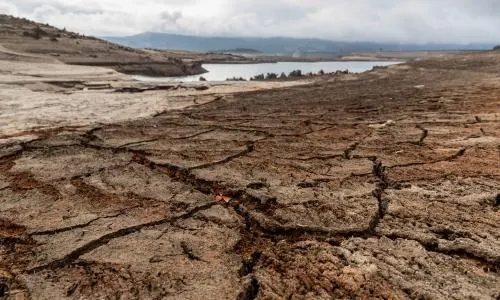A new research has shown that extreme drought in northern Italy has doubled over the past two decades, creating a climate that increasingly mirrors that of Ethiopia and the Horn of Africa.
Analysis of satellite imagery and data released by WaterAid and Cardiff and Bristol universities revealed how global heating is creating a “whiplash effect”, creating erratic extremes. The analysis of climate data finds that under extreme climate pressures, areas that used to experience frequent droughts are now more prone to frequent flooding, while other regions historically prone to flooding now endure more frequent droughts.
According to the analysis, which was published on Tuesday, the southern Shabelle region of Ethiopia, which between 1980 and 2000 experienced numerous periods of flooding, is exhibiting a shift towards prolonged and severe drought.
The Shabelle River, which is a major water source for Somalia, recently experienced the worst of the drought conditions in the Horn of Africa. The increased droughts are mirrored in northern Italy, and the research shows the number of intense dry spells experienced by both areas has more than doubled since 2000.
But as part of what researchers describe as a “climate hazard flip”, the droughts in both regions are punctuated by extreme rainfall causing devastating flooding, which was experienced in the Lombardy region of Italy this summer.
Read also: Research: World behind on almost every policy required to cut carbon emissions
Among other things, the research examined the frequency and magnitude of flooding and drought hazards over the past 41 years in locations across six countries: Pakistan, Ethiopia, Uganda, Burkina Faso, Ghana and Mozambique. Italy was included as a European comparison.
Researchers say that the flip of climate extremes is being experienced by millions of people living in some of the poorest areas of the world, where communities are often ill-equipped to deal with them. Tim Wainwright, the chief executive of WaterAid, said that the climate crisis was a water crisis across the world.
“Our climate has become increasingly unpredictable with devastating consequences,” he said. “From drought-stricken farmlands to flood-ravaged settlements, communities in Pakistan, Burkina Faso, Ghana and Ethiopia are all experiencing alarming climate whiplash effects; Uganda is experiencing ever more catastrophic flooding and Mozambique a chaotic mix of both extremes.”
The research was published on the eve of the UN’s Cop28 climate conference where funds to help communities adapt and become more resilient to the extremes of climate change will be on the agenda once more.
“It cannot be another summit where the climate adaptation can is kicked down the road,” said Wainwright. “Our leaders must recognise the urgency and prioritise investment into robust and resilient water systems now.”
WaterAid is calling on world leaders at Cop28 to prioritise clean water, decent sanitation and hygiene as key components of climate adaptation programmes as well as calling for rapidly scaled-up investment in water security in low- and middle-income countries.
Story was adapted from the Guardian.
